Large Blaze Destroys Food Processing Plant In Iran
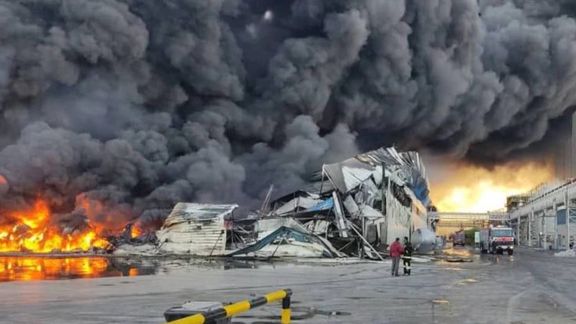
A large blaze with unknown origin broke out in a food processing plant in central Iran early Wednesday that according to local media has destroyed the factory.

A large blaze with unknown origin broke out in a food processing plant in central Iran early Wednesday that according to local media has destroyed the factory.
The plant processes and packages tea and cooking oil. The fire started at 3:00 am according to the manager of the factory. He described the cause of the blaze as “internal” but gave no further details. According to the local governor, Siamak Soleimani, two people have been injured, but images published show extensive flames raging in the complex.
The packaging section and the warehouse of the plant located in an industrial zone have completely burned down.
Law enforcement personnel and firefighters rushed to the scene trying to battle the fire, but Soleimani told the media that the building was still burning in during rush hour. The police chief in the area was one of the injured persons as he tried to fight the fire.
There have been a series of mysterious fires and explosions in Iran’s nuclear, military and industrial facilities since July 2020.
In one such incident lately, a large blaze broke out in an electrical motors manufacturing factory in Shahre Kord, west-central Iran on September 27.
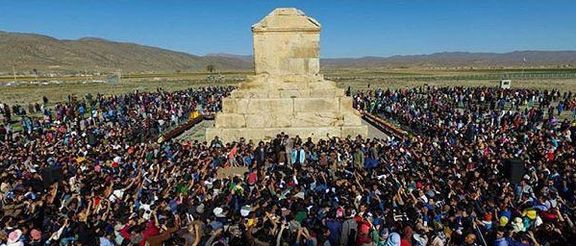
Many ordinary Iranians will mark the Day of Cyrus the Great on October 29, which can turn into a politicized event the Islamic government might try to prevent.
While authorities have been making every effort during the past years to keep the Day of Cyrus the Great a low-key event and to dissuade Iranians from visiting his tomb at Pasargadae, blunders by President Ebrahim Raisi and one of his ministers alerted everyone in Iran that Cyrus Day (October 29) is approaching.
Last week, during a visit to Fars Province in southern Iran, where the 6th century BC Achaemenid monuments Persepolis and the Tomb of Cyrus the Great (circa 600-530 BC) the celebrated Achaemenid king is located, Raisi denounced the Achaemenids as "oppressors" while the ancient dynasty, particularly Cyrus the Great are internationally known as champions of human rights and toleration for religious and ethnic diversity.
Culture and Tourism Minister Ezatollah Zarghami made a bigger and more controversial blunder during his visit to Pasargadae last week. In the countryside, where digging too many wells as well as mismanagement of other water resources, have created massive sinkholes across the Iranian plateau, Zarghami suggested that the government should allow more wells around the historic site.
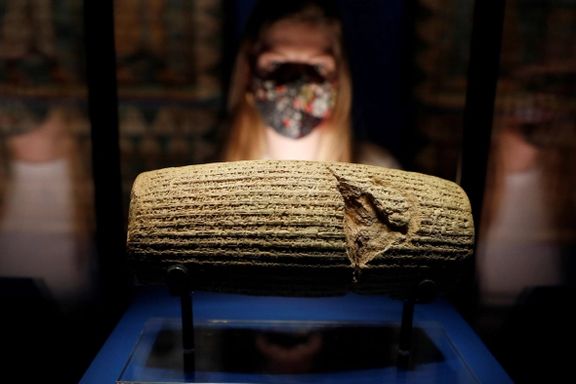
Critics in the press and on social media pointed out that even without new wells, the tomb of Cyrus may disappear in a deep sinkhole any day. Others charged on social media that Zarghami has forgotten that his role is protecting cultural heritage rather than boosting agricultural products.
A commentary on the Asr Iran news website reminded Zarghami that what he suggested was like "planting carrots on a gold mine." Zarghami soon retracted his comment when attacks escalated on social media, but the damage was done.
Social media users such as cultural activist Mohammad Bagher Tabatabai warned Zarghami that "The tomb of Cyrus the Great has a place in the heart of every Iranian. You can never destroy it."
During the past years, particularly after the 1979 Islamic revolution and despite Iranian officials' violent crackdown on pro-monarchy demonstrations, thousands of Iranians visited Pasargadae to pay tribute to the great ancient king. The celebration became a political event in October 2016 when thousands of visitors to the tomb began chanting slogans against the Islamic Republic.
The following year and every year since, the Revolutionary Guards (IRGC) deployed forces to the region and blocked all roads to Pasargadae to prevent the celebrations. But still, thousands of young men and women somehow managed to gather around the monument and sing patriotic hymns.
The commentary in Asr Iran website noted that "Zarghami has never been a tourist or a tour leader and has no experience about protecting cultural heritage. He is a former IRGC officer who has studied urban planning and industrial management. Although he has been deputy culture minister for cinema for a while, yet, surprisingly, someone like him is assigned to protect the country's cultural heritage."
The commentary reminded Zarghami that tourism can produce more financial resources than agriculture. The website suggested that Zarghami should look at Iran's neighbors such as Turkey and see how they make money from tourism. "Turkey's income from tourism is more than Iran's income from oil. Last year Turkey earned $29.5 billion from tourism," claimed the website citing Anatolia news agency.
In 1979, "hanging judge" Sadeq Khalkhali, who killed hundreds after the revolution, had a plan to destroy all monuments including Persepolis as heretic idolatry, but intellectuals and patriotic Iranians prevented the destruction of the sites. Later, most Iranian officials, particularly former President Mahmoud Ahmadinejad realized that they could count on public interest in Iran’s historical heritage to garner support. The blunders by Raisi and Zarghami could signal a return to the ideas of the hanging judge.
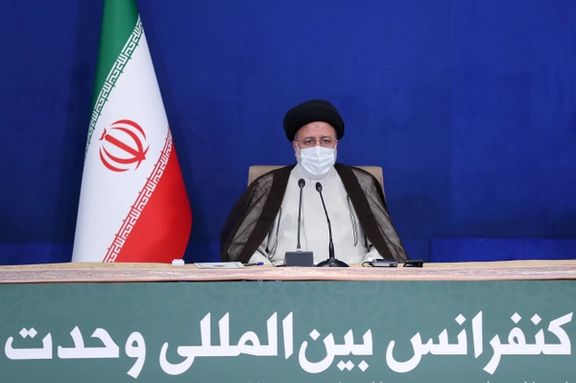
Iran’s president Ebrahim Raisi has said that young Iranians are not attracted to Western culture any longer, while hundreds of thousands emigrate every year.
In the 35th International Conference on Islamic Unity in Tehran on Tuesday Raisi said, “Western culture and political-economic systems are not attractive for the youth. If young [Muslim] people in the past wished to live in a Western cultural environment and lead Western lifestyles, today they do have such demands.”
Raisi’s statement comes across as a contradiction to years of statements by Islamic Republic officials who have been voicing alarm at the high rate of emigration and what is usually dubbed as a “brain-drain”.
On the same day when Raisi spoke, a prominent economist, Bahman Arman, told the Iranian Labour News Agency (ILNA) that 700,000 people leave Iran every year, citing figures by the Statistical Center of Iran. While economic reasons exist for migration, religious restrictions on social life is an important factor in encouraging relocation to other countries.
Raisi’s statement also contradicts a huge morality police force that arrests young people daily, especially women for preferring a free lifestyle and defying obligatory hijab and restrictions on mixed-gender social gatherings.
In 2017, a top official in the ministry of roads said that 1.5 million professional and educated Iranians are waiting to emigrate to Australia and Canada.
The Islamic conference is a public relations event organized by the Islamic Republic to show that there is unity among Shiites and Sunnis and to carve a place for the clerical regime among other Muslims.
Raisi in his speech also praised Qassem Soleimani, the former commander of the Qods (Quds) Force, claiming that the general who was killed by US drones in January 2020, was a leading figure in promoting Islamic unity. In fact, Soleimani was seen by many Sunnis as a dividing figure, bent on arming and using Shiites to advance Iran’s foreign policy goals in the region.
Raisi also said that after the second World War “the ruling system” only saw one power on its way to full domination and that was Islam. The statement is not compatible with history that witnessed an epic rivalry between the United States and the Soviet Union, or capitalist democracies and Communist dictatorships. Political Islam did not emerge as a force until the late 1970s.
Iran’s hardline president went on to say that there is an “Islamic awakening” now that should not “go cold”. He accused the West of conspiracies such as allegedly creating the Islamic State group and dividing the Muslim world. He called on the participants in the conference to unite against conspiracies and defend the Palestinians, which he said is the most important issue for the Muslim world.
Raisi told the conference that the Islamic Republic pursues stability in Muslim countries while “the enemy” is bent on creating instability. The term ‘enemy’ for the Islamic Republic usually means the United States and Israel.

Production of the Fakhravac Covid vaccine, one of eight Iranian inoculations developed by the defense ministry is to stop due to lack of demand as imports grow.
Ahmad Karimi, head of the Fakhravac project, told the Iranian Labour News Agency (ILNA) Tuesday there was a lack of demand for the vaccine, even though 1 million doses had been produced with a first batch ready for use.
Karimi complained that the project had received 10 million euros ($12 million) in advance purchase from the government while other domestic vaccine developers received 40 million each. He added that with the increasing rate of vaccinations in Iran, Fakhavac had struggled like other projects for home-grown vaccines, to recruit volunteers.
"We expected to have between 1,000 and 1,500 volunteers a day, but the number has dropped to around 100,” he said. “It has become a challenge because in the third phase of the clinical trial the sample groups need to be large.”
The deputy head of the Food and Drug Administration (FDA), Heydar Mohammadi, told Borna news agency Tuesday that the FDA was considering full authorization for third- booster shots of both Fakharavac and Razi Cov Pars, developed by the Razi Vaccine and Serum Research Institute and in a third clinical research phase.
Iran has now fully vaccinated 25 million from a population of 84 million, with 60 million doses of China’s Sinopharm making up a majority of 72.6 million (first and second) doses administered. The main domestically produced vaccine, Barakat, accounts for 5.7 million doses.
Fakhravac, produced by the defense ministry's Organization of Defensive Innovation and Research (ODIR), entered the third clinical trial phase after being authorized for emergency usein early September. The defense ministry in September said a factory was being built to produce 1 million doses monthly of Fakhravac, which is named after Mohsen Fakhrizadeh, the nuclear scientist assassinated in November 2020, allegedly by Israel.
Major-General Hossein Salami, commander of the Revolutionary Guards (IRGC), said in August that Noora, a second vaccine being developed by the defense ministry, at the IRGC's Baqiyatallah University of Medical Sciences, was in the second stage of human trials.
Iran's other main vaccine authorized for emergency use, CovIran Barakat, was developed by Barakat Foundation, a charitable body and business group that is an affiliate of the Execution of Imam Khomeini’s Order Foundation. The foundation is a charitable-cum-business state entity answerable to the Supreme Leader Ali Khamenei.
CovIran Barakat, failed to meet a delivery target of 50 million doses by the end of September. In a radio interview in August Hossein-Ali Shahriari, the conservative chairman of parliament’s health committee, said that awaiting homegrown vaccines had slowed down imports and so the rate of vaccinations.
More than 124,000 have died of Covid in Iran according to official figures, that are deemed to be much less than real numbers, by critics who say the government has under-reported the pandemic toll. The death rate has decreased in October as vaccination increased since August, but some health officials have warned of a sixth wave in the coming weeks.

A female Iranian political prisoner has told her family that she has been repeatedly subjected to strip-down searches in various detention centers.
Mozhgan Kavosi was first arrested in northern Iran during the November 2019 nationwide protests and sentenced to six months in prison by a local prosecutor. Later her sentence increased during an appeal to nearly seven years.
Kavosi, who is a 45-year-old mother of two daughters, belongs to a religious minority but she was charged with propaganda against the regime and an array of other vague political accusations.
Kavosi told her family that every time she was stripped-searched, she told prison guards that she is a political prisoner, not a common criminal and their intrusion into her privacy is simply a psychological pressure tactic.
In line with a recent policy of ‘exiling’ political prisoners to distant prisons, Kavosi is now serving her time in Karaj, near Tehran. The tactic is meant to make it harder for their families to visit them.
Kavosi has also been deprived of her lawyer, Mostafa Nili, who was arrested in August along with others for threatening to sue Supreme Leader Ali Khamenei for banning American and British Covid vaccines and causing thousands of more deaths.
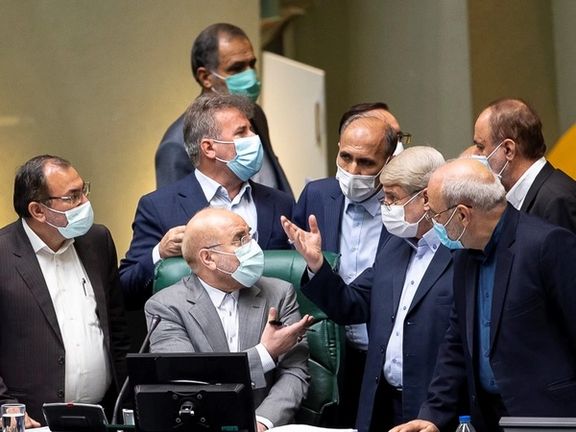
President Ebrahim Raisi's honeymoon with Iran's hardliners in and out of the parliament (Majles) seems to be over, as criticism has mounted.
Iranian media including Etemad daily and Rouydad24 website noted that only 74 days after his inauguration as Iran's new President Raisi (Raeesi) faced serious opposition in the parliament on Sunday.
A day before that, pro-administration news agency ISNA had lashed out at Majles Speaker Mohammad Bagher Ghalibaf for criticizing the Raisi administration and calling it "an incompetent government with inefficient managers.” Only one day after that hardline daily Kayhan, that often speaks for Supreme Leader Ali Khamenei's office, criticized the Raisi administration over the rising price of home appliances.
The media were surprised that it was the like-minded conservative camp and not his political rivals in the reform camp who have started criticizing Raisi's government without even giving him a hundred days for trial and error.
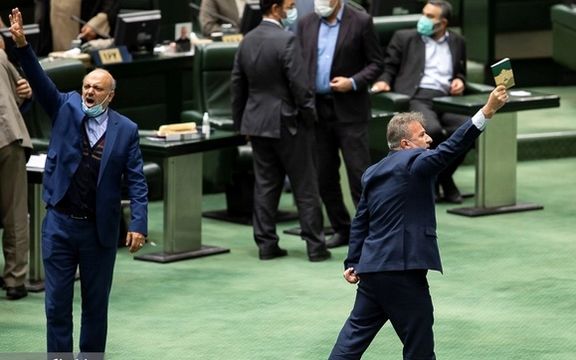
Hardline lawmaker Elias Naderan on Sunday warned Raisi not to try to circumvent the Majles. He made the comment in response to the administration's decision to amend the budget bill to meet some of the long-standing salary demands of Iranian teachers who have been taking to the streets to voice their grievances in recent months. Naderan attributed "most of the country's problems" to "lack of coordination in Raisi's economic team." He asked: "Who is responsible for the situation of the country's economy?"
Meanwhile, Naderan warned Raisi that "The decline of the national economy will inevitably entail an uncontrollable rate of inflation."
Other lawmakers said it was regrettable that they had to address the Raisi administration with the same critical rhetoric they used against the Rouhani administration, Etemad reported. The daily also quoted the lawmakers as saying that "regrettably, Raisi's responses to criticisms is the same as his predecessor's and the problems in question remain the same."
The media agreed that some of the criticism may be motivated by factional and individual expectations but at least part of it highlights demands that have remained unmet as more than two months have passed since Raisi's promises to tackle them.
Ironically, the president was in a meeting of the government's Economic Coordination Board exactly at the same time his economic policies were being questioned by the Majles. The parliament first discussed issues of foreign policy with Foreign Minister Hossein Amir-Abdollahian at a session behind closed doors and then started an open session about the economic and financial issues, including the teachers' case.
According to reports, the general mood at the session was one of disagreement with Raisi's economic policies. One of the MPs close to Ghalibaf even said that the attempt to unify the government has effectively "slaughtered” the revolution. Hardline supporters of Khamenei have taken over all three branches of the government since 2020, with promises that united “revolutionary forces” would work efficiently to solve mounting problems.
One of the advocates of the ‘revolutionary’ brand, Ruhollah Izadkhah, called for "purging the country's management of godfathers and those who pursue their own political goals rather than following the interests of the nation." Izadkhah had earlier warned Raisi to get rid of red tape and not allow wrapping a revolutionary title around inefficient approaches." He told Raisi: "Hand over the government to the people and the youths."
Also in Sunday's session, Ghelich Shadmehr, another lawmaker, harshly criticized the Raisi administration for creating security problems in parts of the country by changing provincial boundaries which he said is an unnecessary measure. Mansur Arami, a lawmaker from Hormozgan Province also raised the same concern about his constituency.
In another development, hardline daily Kayhan referred to Khamenei's order to ban the import of Korean-made home appliances and said the way the government enforced the ban has led to an unusual rise in the price of Iranian-made home appliances. According to Kayhan, as the government did not oversee the operation of Iranian companies, they increased the price of their products without increasing their output and improving quality.